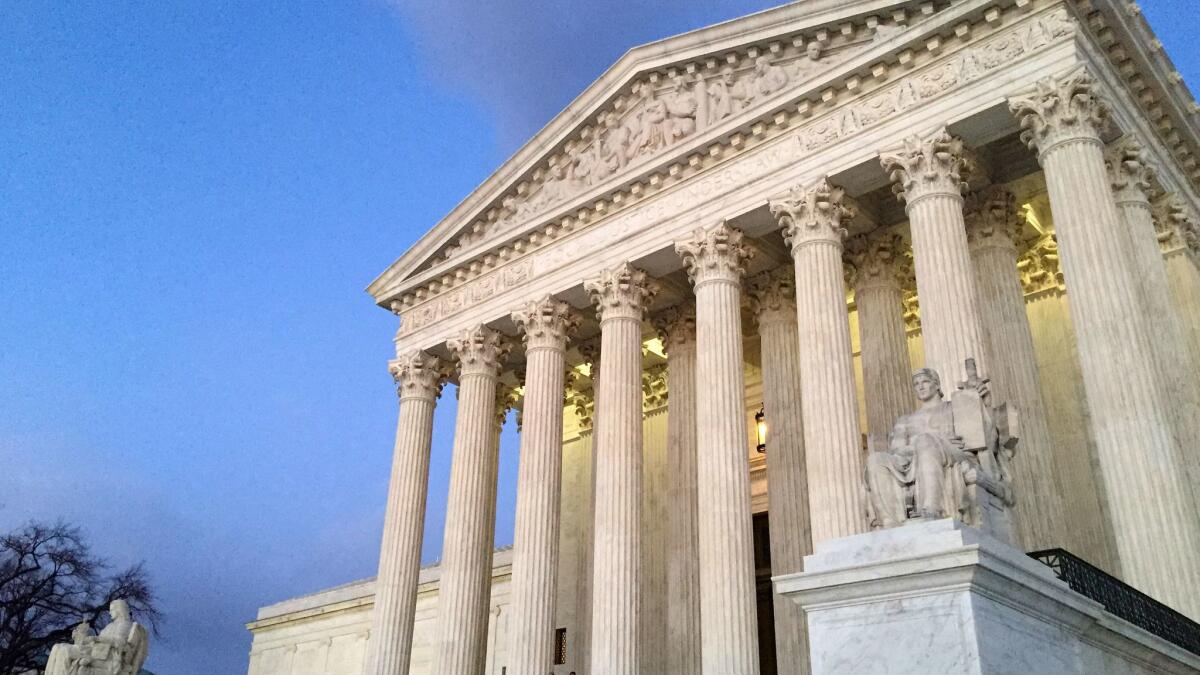Supreme Court turns down property-rights challenge to developer fees in West Hollywood

- Share via
Reporting from Washington — The Supreme Court said Monday it has turned down a property rights case from West Hollywood that challenged a California requirement that developers subsidize the creation of affordable housing.
The justices said Monday they will not hear an appeal from the builders of an 11-unit condo who said the fees violate the Constitution’s prohibition against taking private property “for public use without just compensation.”
Separately, the court took no action Monday on several appeals from anti-abortion groups challenging another California law that requires “crisis pregnancy centers” to notify clients that the state offers subsidized contraception and abortion to eligible women.
The court’s action on the developer-fee case comes as a disappointment to builders and business groups that had hoped the more conservative justices would rein in the power of local governments to demand fees or other benefits in exchange for approving a building permit.
The California courts have said these fees are not an “exaction” or a taking of property, but rather a reasonable regulation of development.
Lawyers for West Hollywood said the California Legislature has required cities and counties to take specific steps to promote the creation of more affordable housing. The city has required developers to either set aside 20% of the units to be sold at below-market rates or to pay a fee that will be used to subsidize housing for people with low or moderate incomes.
Jonathan and Shelah Lehrer-Graiwer applied for a permit to build the 11-unit condo at 616 N. Croft Ave. and were required to pay a fee of $540,000 to subsidize affordable housing elsewhere. They objected, citing Supreme Court rulings that said permit restrictions must be related to the impact of a new development.
A state appeals court rejected their constitutional challenge, citing a California Supreme Court ruling two years ago that upheld a similar ordinance in San Jose.
“As in San Jose, the purpose of the in-lieu housing fee here is not to defray the cost of increased demand on public services resulting from Croft’s specific development project, but rather to combat the overall lack of affordable housing,” the state appeals court said. West Hollywood’s ordinance qualifies as a “land use regulation,” not an unconstitutional taking of private property, because it does not “deprive a property owner of all viable economic use of the property,” the state judges said.
Lawyers for the Pacific Legal Foundation in Sacramento appealed on behalf of the developers, urging the high court to decide whether the U.S. Constitution puts limits “on a government’s authority to use the permit process to force private property to dedicate private property to a public use.”
Major questions before the Supreme Court this fall »
On Twitter: DavidGSavage
ALSO
Up to 600,000 expected to apply when L.A. reopens Section 8 housing list this month after 13 years
Home prices in Southern California reach bubble-era highs
Gov. Brown signed 15 housing bills. Here’s how they’re supposed to help the affordability crisis
More to Read
Get the L.A. Times Politics newsletter
Deeply reported insights into legislation, politics and policy from Sacramento, Washington and beyond. In your inbox twice per week.
You may occasionally receive promotional content from the Los Angeles Times.











